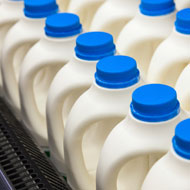
Government urged to protect farmers in milk report
MPs are calling on the government to offer greater protection to dairy farmers in the face of rapid cuts to milk prices.
A report on dairy prices released today (January 20) makes a series of recommendations for tackling the current dairy crisis.
Milk prices have fallen rapidly over the past six months, which is partly due to a Russian trade ban with the EU and a reduced demand from China. As a result, 60 UK farmers left the business in December 2014 alone, and for the first time, producer numbers have dropped below 10,000.
The situation prompted an inquiry last year to gather a snapshot of the difficulties facing British farmers.
Commenting as the dairy report was published, Anne McIntosh, who is chair of the Environment, Food and Rural Affairs (Efra) Committee, said: "Frequent, sharp and unpredictable rises and falls in milk price are driving dairy farmers out of business every week.
"The volatility of worldwide and domestic milk markets is making financial planning and investment impossible for small-scale producers unable to hedge against changes beyond their control."
Committee MPs are urging the government to include dairy farmers and other small-scale producers in the protection offered by the Groceries Code Adjudicator (GCA). The GCA can investigate complaints relating to the direct suppliers to the big 10 retailers. As the majority of milk producers are small-scale, most dairy farmers are currently excluded from this protection.
Efra Committee also strongly criticised the government for failing to activate the GCA's power to fine retailers who break the code of best practice.
Ms McIntosh said: "We were shocked to learn in evidence that the government have spent more than a year failing to set the level of fine the GCA can seek when she finds against a retailer. This leaves her unable to use her main power."
In its report, the committee also seeks an EU-wide review of the milk intervention price and calls on farmers to form producer organisations to increase their clout in the market.
The government is furthermore urged to help producers tap into a greater number of export opportunities, improve codes of practice in the dairy industry and to press for clearer country-of-origin labelling on products.
Read the dairy price report here: http://www.publications.parliament.uk/pa/cm201415/cmselect/cmenvfru/817/81702.htm



 The Veterinary Medicines Directorate (VMD) is inviting applications from veterinary students to attend a one-week extramural studies (EMS) placement in July 2026.
The Veterinary Medicines Directorate (VMD) is inviting applications from veterinary students to attend a one-week extramural studies (EMS) placement in July 2026.